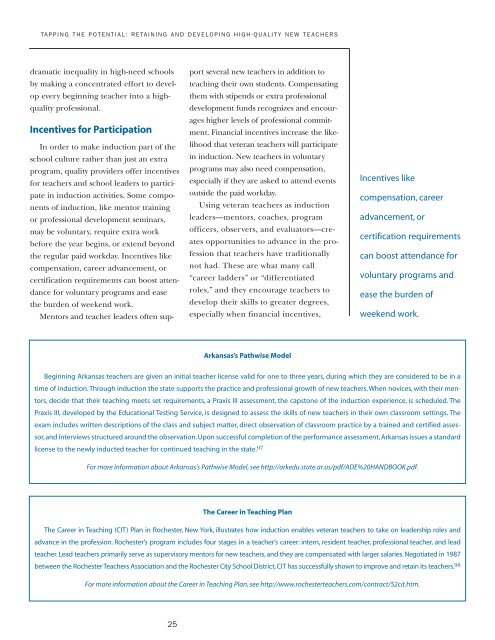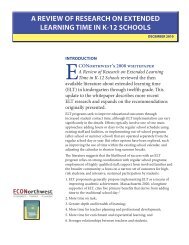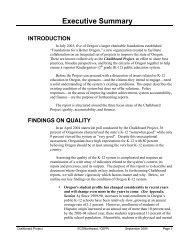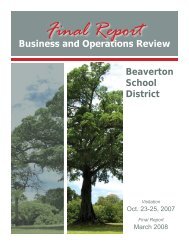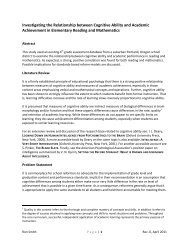Tapping the Potential - Alliance for Excellent Education
Tapping the Potential - Alliance for Excellent Education
Tapping the Potential - Alliance for Excellent Education
Create successful ePaper yourself
Turn your PDF publications into a flip-book with our unique Google optimized e-Paper software.
TA P P I N G T H E P O T E N T I A L : R E TA I N I N G A N D D E V E L O P I N G H I G H - Q U A L I T Y N E W T E A C H E R Sdramatic inequality in high-need schoolsby making a concentrated ef<strong>for</strong>t to developevery beginning teacher into a highqualityprofessional.Incentives <strong>for</strong> ParticipationIn order to make induction part of <strong>the</strong>school culture ra<strong>the</strong>r than just an extraprogram, quality providers offer incentives<strong>for</strong> teachers and school leaders to participatein induction activities. Some componentsof induction, like mentor trainingor professional development seminars,may be voluntary, require extra workbe<strong>for</strong>e <strong>the</strong> year begins, or extend beyond<strong>the</strong> regular paid workday. Incentives likecompensation, career advancement, orcertification requirements can boost attendance<strong>for</strong> voluntary programs and ease<strong>the</strong> burden of weekend work.Mentors and teacher leaders often supportseveral new teachers in addition toteaching <strong>the</strong>ir own students. Compensating<strong>the</strong>m with stipends or extra professionaldevelopment funds recognizes and encourageshigher levels of professional commitment.Financial incentives increase <strong>the</strong> likelihoodthat veteran teachers will participatein induction. New teachers in voluntaryprograms may also need compensation,especially if <strong>the</strong>y are asked to attend eventsoutside <strong>the</strong> paid workday.Using veteran teachers as inductionleaders—mentors, coaches, programofficers, observers, and evaluators—createsopportunities to advance in <strong>the</strong> professionthat teachers have traditionallynot had. These are what many call“career ladders” or “differentiatedroles,” and <strong>the</strong>y encourage teachers todevelop <strong>the</strong>ir skills to greater degrees,especially when financial incentives,Incentives likecompensation, careeradvancement, orcertification requirementscan boost attendance <strong>for</strong>voluntary programs andease <strong>the</strong> burden ofweekend work.Arkansas’s Pathwise ModelBeginning Arkansas teachers are given an initial teacher license valid <strong>for</strong> one to three years, during which <strong>the</strong>y are considered to be in atime of induction. Through induction <strong>the</strong> state supports <strong>the</strong> practice and professional growth of new teachers. When novices, with <strong>the</strong>ir mentors,decide that <strong>the</strong>ir teaching meets set requirements, a Praxis III assessment, <strong>the</strong> capstone of <strong>the</strong> induction experience, is scheduled. ThePraxis III, developed by <strong>the</strong> <strong>Education</strong>al Testing Service, is designed to assess <strong>the</strong> skills of new teachers in <strong>the</strong>ir own classroom settings. Theexam includes written descriptions of <strong>the</strong> class and subject matter, direct observation of classroom practice by a trained and certified assessor,and interviews structured around <strong>the</strong> observation. Upon successful completion of <strong>the</strong> per<strong>for</strong>mance assessment, Arkansas issues a standardlicense to <strong>the</strong> newly inducted teacher <strong>for</strong> continued teaching in <strong>the</strong> state. 97For more in<strong>for</strong>mation about Arkansas’s Pathwise Model, see http://arkedu.state.ar.us/pdf/ADE%20HANDBOOK.pdf.The Career in Teaching PlanThe Career in Teaching (CIT) Plan in Rochester, New York, illustrates how induction enables veteran teachers to take on leadership roles andadvance in <strong>the</strong> profession. Rochester’s program includes four stages in a teacher’s career: intern, resident teacher, professional teacher, and leadteacher. Lead teachers primarily serve as supervisory mentors <strong>for</strong> new teachers, and <strong>the</strong>y are compensated with larger salaries. Negotiated in 1987between <strong>the</strong> Rochester Teachers Association and <strong>the</strong> Rochester City School District, CIT has successfully shown to improve and retain its teachers. 98For more in<strong>for</strong>mation about <strong>the</strong> Career in Teaching Plan, see http://www.rochesterteachers.com/contract/52cit.htm.25


